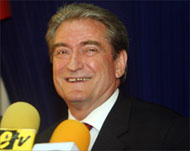Albanian elections criticised
European election monitors have criticised Albania’s main political parties after irregularities marred a hard-fought election seen as a crucial test of the country’s ambitions to join the European Union.

On Monday the Organisation for Security and Cooperation in Europe (OSCE), in a joint statement with the Council of Europe and the European Parliament, said Sunday’s election only in part lived up to democratic standards.
The election “complied only partially with … international standards for democratic elections”, the OSCE said in a statement.
“Major political parties have yet to demonstrate political will and responsibility to a measure commensurate with the broad authority granted to them by the electoral process,” the statement said.
Uniform system
It said the authorities had failed to introduce a uniform system of addresses and personal identification documents, throwing doubt on voter lists, and bickering between political parties had hampered other preparations.
“In view of future elections, further improvements to the electoral framework would require urgent attention and more inclusive efforts,” it said.
A free and fair vote is essential for Albania’s hopes of signing an accession accord with the European Union this year, a key step toward eventual membership possibly in 2014.
OSCE mission chief Jurgen Grunnet said several incidents had “cast a shadow over the process”, which has been billed by the European Union as a chance for Albania to prove its democratic credentials.
An observer from the right-wing Republican party died after being shot during a dispute with a political opponent at one polling station in Tirana, police said, but it was unclear whether the murder was directly linked to the election.
Communist isolation
Albania emerged from decades of communist isolation in the early 1990s and many of its subsequent elections have been marred by violence and fraud.
The election for the 120-seat parliament was fought mainly between the Socialist party of Prime Minister Fatos Nano and the Democrats led by Sali Berisha.
 |
|
Berisha:”We have won the |
The first official results were not expected until later Monday but both parties publicly claimed victory late Sunday even before counting had begun.
“We have won, our victory is profound,” said Gramoz Ruci of the ruling Socialists after polling stations closed.
But Berisha said his right-wing party was set to regain power after eight years in opposition. “We have won in the majority of the country,” he said, calling on his supporters to show “restraint and modesty”.
Eve of poll surveys gave Berisha the narrowest of leads – 35% against 34% for Nano. One poll by the Gani Bob agency late Sunday gave Berisha the advantage in 15 out of 100 electoral districts.
Analysts said strong turnout of 57% was likely to favour the Democratic party.
Decisive lead
With vote counting under way but no official results released, election officials said neither the Socialists nor the Democrats had a decisive lead.
Electoral commission spokesman Erton Sinani said the trend after about 5% of the vote had been counted was for the Democratic party, but this could change as more results came in.
About 2.8 million people were eligible to vote, choosing between 1253 candidates from 27 parties and coalitions.
Fears of violence proved unfounded during the vote but observers said the biggest test would come after the results were announced and one side had to admit defeat.
Observers in Brussels will be less concerned about the result than the way the election was conducted.
Nearly 6400 police were deployed at polling stations, with 400 foreign and 3500 Albanian observers monitoring the election.